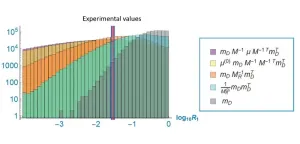(Press-News.org) The risk of developing cardiovascular disease is lower in people with obesity who have a genetic predisposition for high BMI than people with obesity influenced mainly by environmental factors such as lifestyle, researchers from Karolinska Institutet report in eClinicalMedicine.
There has been a global increase in the incidence of overweight and obesity over the past few years. Almost one third of the world’s population now lives with overweight or obesity.
“The figure is alarming since it is well-established that a high BMI in middle-age increases the risk of developing cardiovascular disease and other conditions,” says Ida Karlsson, assistant professor at the Department of Medical Epidemiology and Biostatistics, Karolinska Institutet.
However, according to this new study, the risk of developing cardiovascular diseases varies widely among people with obesity. The researchers used data from over 15,000 twins from the Swedish Twin Registry, gathering information about their BMI and their genetic predisposition for high BMI. They also used data from medical registries to establish the incidence of cardiovascular disease in this group.
By analysing this information, the researchers were able to study how overweight and obesity as a result of genetic versus environmental and lifestyle factors influenced the risk of cardiovascular disease.
“The link between obesity and cardiovascular disease was twice as strong in those with a genetic predisposition to a low BMI as it was in those with obesity driven by genetic factors,” says the study’s last author Ida Karlsson.
Dr Karlsson stresses that a healthy lifestyle is always important for everyone, and that the risk of cardiovascular disease was higher in all people with overweight or obesity compared to people with a healthy weight. However, the findings also indicate that obesity mainly driven by genetic factors might not have the same adverse impact on health as obesity driven by other factors, such as lifestyle.
“Obesity is a complex common disease that can have many different causes,” she says. “Since it’s so stigmatised, the results can help us understand that its effects on health differ from one individual to the next.”
She continues: “Even though we all know that it takes more than exercise and diet to combat obesity, there’s still a large stigma attached to it. I think much could be gained by focusing on what has caused the obesity and what we can do to reduce the risk of comorbidities in each individual instead of mainly focusing on BMI.”
The next step of Dr Karlsson’s research is to examine how individuals with overweight and obesity caused, respectively, by genetic and lifestyle factors differ as regards to blood glucose levels, cholesterol and inflammation markers.
The study was mainly financed by the Swedish Research Council for Health, Working Life and Welfare (Forte) and the Strategic Research Area in Epidemiology and Biostatistics at Karolinska Institutet. The researchers report no conflicts of interest.
Publication: “Genetically and environmentally predicted obesity in relation to cardiovascular disease: a nationwide cohort study”. Elsa Ojalehto, Yiqiang Zhan, Juulia Jylhävä, Chandra A. Reynolds, Anna K. Dahl Aslan, Ida K. Karlsson. eClinicalMedicine, online 6 April 2023, doi: 10.1016/j.eclinm.2023.101943
END
People with obesity due to genetic predisposition have lower risk of cardiovascular disease
2023-04-06
ELSE PRESS RELEASES FROM THIS DATE:
Obstructive sleep apnea may directly cause early cognitive decline
2023-04-06
Obstructive sleep apnea (OSA) is a potentially dangerous condition. During sleep, the throat muscles of people with OSA relax and block the airflow into the lungs, so that they repeatedly stop breathing. Common symptoms of OSA include restless sleep, loud snoring, daytime sleepiness, and prolonged headaches in the morning – highly debilitating for patients and their partners.
OSA is currently underdiagnosed: it may occur in as much as 15 to 30% of men and 10 to 15% of women, or approximately 1bn adults worldwide, of whom an estimated 80% don’t know they have it. Major risk factors for OSA include middle or old age, being obese, smoking, ...
Random matrix theory approaches the mystery of the neutrino mass!
2023-04-06
When any matter is divided into smaller and smaller pieces, eventually all you are left with—when it cannot be divided any further—is a particle. Currently, there are 12 different known elementary particles, which in turn are made up of quarks and leptons each of which come in six different flavors. These flavors are grouped into three generations—each with one charged and one neutral lepton—to form different particles, including the electron, muon, and tau neutrinos. In the Standard Model, the masses of the three generations of neutrinos are represented by a three-by-three ...
Lab-grown fat could give cultured meat real flavor and texture
2023-04-06
Researchers at Tufts University have successfully bulk-produced fat tissue in the lab that has a similar texture and make-up to fat tissue naturally occurring in animals. The results, described in a study published today in eLife, could be applied to the production of cultured meat grown entirely from cells, giving it a more realistic texture and flavor.
Startup companies around the world are developing cultivated meat—cell-grown chicken, beef, pork, and fish. Most are in early stages of development, not ready for large-scale production and, with a ...
Disruption from war in Ukraine pushes highly contagious infectious diseases to alarming levels
2023-04-06
Analysis of official Ukraine health data reveals a perfect storm of rising infectious diseases cases and falling levels of childhood vaccination and case detection in the frontline eastern region of Kharkiv.
Between January and September 2022, new cases of rubella were 23 times higher among children living in the Kharkiv region than average rates across Ukraine, while shigellosis (diarrhoeal disease) and viral meningitis incidence was around 6 times higher, and whooping cough 5 times greater.
But registration of infectious disease cases halved in Kharkiv ...
Air pollution may increase risk for dementia
2023-04-06
Key points:
This meta-analysis, which includes the most recent studies evaluating the link between air pollution and dementia, is the first to include studies based on active case ascertainment and to evaluate studies using a new, more powerful bias assessment tool.
The findings support the public health importance of a proposal, currently under consideration by the Environmental Protection Agency, to strengthen regulations on PM2.5
Boston, MA—Exposure to fine particulate air pollutants (PM2.5) may increase the risk of developing dementia, according to a new meta-analysis from Harvard T.H. Chan School of Public Health.
“This is a big step in providing actionable ...
Exposure to fine particle air pollution linked to heightened dementia risk
2023-04-06
Exposure to fine particulate matter (PM2.5) air pollution is linked to a heightened risk of dementia, even at levels below current US, UK and European air quality standards, finds research published by The BMJ.
More limited data suggests that exposure to nitrogen dioxide and nitrogen oxide might also be a risk factor for dementia.
Many uncertainties remain, so caution is needed when interpreting these findings, but the researchers say the results “strengthen the evidence that air pollutants are risk factors for dementia.”
More than 57 million people worldwide are living with dementia and the global ...
Limit added sugar to six teaspoons a day to improve health, urge experts
2023-04-06
Experts recommend reducing consumption of added (“free”) sugars to around six teaspoons a day and limiting sugar-sweetened drinks to less than one serving a week after a comprehensive evidence review published by The BMJ today.
They found significant harmful associations between sugar consumption and 45 outcomes, including asthma, diabetes, obesity, heart disease, depression, some cancers and death.
It’s widely known that excessive sugar intake can have negative effects on health and this has prompted the World Health Organization (WHO) and others to suggest reducing consumption of free or added sugars ...
Healthy lifestyle associated with reduced mortality risk in childhood cancer survivors
2023-04-06
(MEMPHIS, Tenn. – April 05, 2023) A report from the Childhood Cancer Survivor Study (CCSS) provides strong evidence of the importance of a healthy lifestyle for adults who were treated for cancer as children. The study is the first to find that the specific primary causes of death in long term survivors are many of the same leading causes of death in the U.S. population, often occurring at younger than expected ages. It also found that adult survivors of childhood cancer experience four times the risk of late mortality as the general population, even 40 years after diagnosis. However, ...
Texas Children’s and Baylor College researchers use innovative dual-target deep brain stimulation approach to treat patients with obsessive-compulsive disorder and Tourette Syndrome
2023-04-06
Up to two-thirds of patients with Tourette syndrome (TS), a tic disorder characterized by sudden uncontrollable physical movements, also suffer from obsessive-compulsive disorder (OCD), a psychiatric condition characterized by intrusive thoughts and repetitive behaviors. Unfortunately, many of these dual-diagnosis patients are resistant to conventional treatments such as medications or behavioral therapy. While deep brain stimulation (DBS) has been approved for compassionate use by the U.S. Food and Drug Administration for OCD, this promising procedure is under investigational use for ...
USC study: Disruptions in exports of grains from Ukraine and Russia cost the world’s economy more than $1.6 billion during the first year of war
2023-04-06
Russia’s invasion of Ukraine has struck a major blow to global markets for vital commodities – particularly grains like wheat and maize. Shortages and price increases are contributing to the food insecurity crisis in certain parts of the world, according to the United Nations, and to more general economic uncertainty.
A new study led by Adam Rose, research professor at the USC Sol Price School of Public Policy and its Center for Risk and Economic Analysis of Threats and Emergencies (CREATE), estimates that disruption to exports of grain commodities during a projected one-year period of the war will result in a $1.6 billion loss for the global economy.
The study was recently ...


